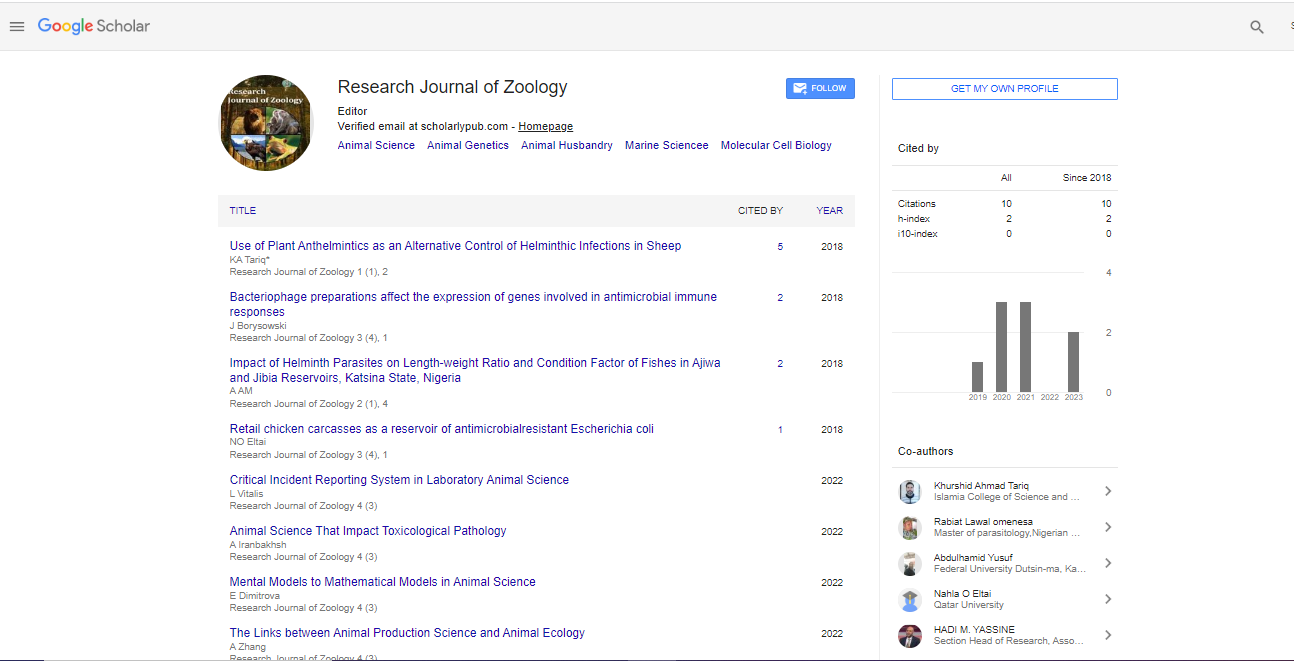Opinion Article, Res J Zool Vol: 5 Issue: 4
Importance of Animal Science, Biological Conservation and Animal Management
Carmeliet Fabiene*
1Department of Animal Science, University of Lausanne, Lausanne, Switzerland
*Corresponding Author: Carmeliet Fabiene,
Department of Animal Science,
University of Lausanne, Lausanne, Switzerland
E-mail: fabien.car@gmail.com
Received date: 21 November, 2023, Manuscript No. RJZ-24-128367;
Editor assigned date: 23 November, 2023, PreQC No. RJZ-24-128367 (PQ);
Reviewed date: 07 December, 2023, QC No. RJZ-24-128367;
Revised date: 15 December, 2023, Manuscript No. RJZ-24-128163 (R);
Published date: 22 December, 2023, DOI: 10.4172/RJZ.1000095.
Citation: Fabiene C (2023) Importance of Animal Science, Biological Conservation and Animal Management. Res J Zool 5:4.
Description
Animal science, a multidisciplinary field at the intersection of biology, behavior, genetics, and ecology, serves as a direction to identifying the mysteries of the animal dimension. From the microscopic complexities of cellular processes to the majority of ecological systems, animal science examine into the diverse fields of life on Earth. Animal science aims to recognize the biological principles that control the structure, function, and behavior of animals. This multifaceted discipline encompasses a wide range of categories, including zoology, ethology, physiology, genetics, and ecology, each contributing distinct opinions to the more understanding of animal life.
Zoology, the study of animals, serves as a foundational of animal science. From invertebrates to vertebrates, zoologists classify, describe, and investigate the vast diversity of animal organisms. Through taxonomy and systematics, scientists organize this diversity into a consequent framework, exploring the genetic connections that contribute different categories of the animal life.
Ethology, the study of animal behavior, enhances zoology by studying into the complicated designs of actions and reactions exhibited by animals. An ethologist aims to understand the adaptive significance of behaviors, exploring how they contribute to an organism's survival, reproduction, and interaction with its environment.
Physiology is another essential component of animal science, explores the physiological processes that occur within the bodies of animals. From the cellular level to organ systems, physiologists investigate the mechanisms that enable animals to function, reproduce, and respond to environmental stimulation. This knowledge provides insights into the intricate workings of life, from the beating of a hummingbird's wings to the complex metabolic processes of mammals.
Genetics is an immediately evolving field within animal science, focuses on the hereditary mechanisms that shape the traits and characteristics of animals. Advances in molecular genetics have provided the complexities of DNA, allowing scientists to explore the genetic basis of traits, behaviors, and evolutionary relationships between organisms.
Ecology, the study of interactions between organisms and their environments, completes the fundamental foundation of animal science. Ecologists investigate the distribution, abundance, and relationships of animals within ecosystems, providing illumination on the complicated network of connections that supports life on Earth.
Effects of agricultural practices
Animal science plays an important role in improving agricultural practices, Supporting to the improvement in productivity of animals, health of animals, and sustainable agricultural practices. Livestock science, a group of animal science, focuses on the breeding, nutrition, and management of domesticated animals, aiming to enhance their well-being and productivity.
Selective breeding, guided by principles of genetics and animal physiology, has led to the development of livestock breeds with improved traits such as milk production, meat quality, and disease resistance. This scientific method has revolutionized agriculture, allowing farmers to breed animals that are better suited to specific environmental conditions and market demands.
Animal nutrition is another essential aspect of agricultural science. Researchers in this field study the dietary requirements of animals to ensure optimal growth, reproduction, and overall health. This knowledge is instrumental in formulating balanced and cost-effective animal feeds, contributing to efficient livestock management.
Veterinary medicine, an integral part of animal science, focuses on the health and well-being of animals. Veterinarians utilize their knowledge of animal physiology, genetics, and pathology to diagnose and treat diseases, prevent the spread of zoonotic diseases (those can be transmitted between animals and humans), and contribute to the overall welfare of both domesticated and wild animals.
Biological conservation and animal management
In addition to the field of agriculture, animal science plays a significant role in conservation biology and animal management. Conservation biologists employ principles from genetics, ecology, and behavior to study Dangerous organisms, assess threats to biodiversity, and develop techniques for the sustainable management of ecosystems.
Genetic methods, such as population genetics and DNA analysis, are essential tools in conservation biology. Scientists use these techniques to assess the genetic diversity of populations, identify individuals, and implement genetic management methods to prevent inbreeding and maintain the long-term viability of organisms.
 Spanish
Spanish  Chinese
Chinese  Russian
Russian  German
German  French
French  Japanese
Japanese  Portuguese
Portuguese  Hindi
Hindi 
